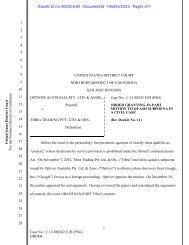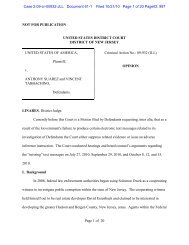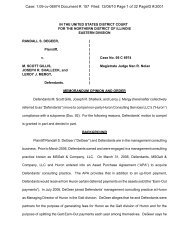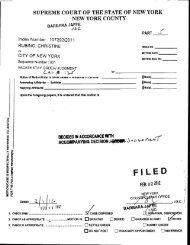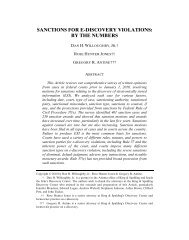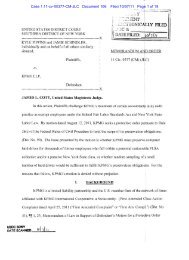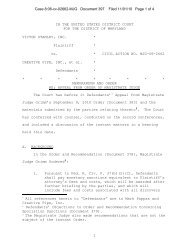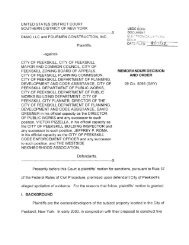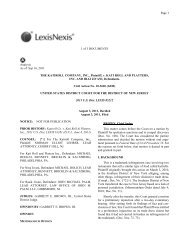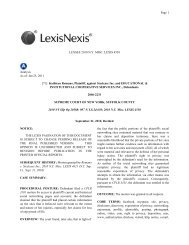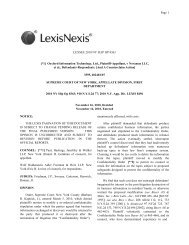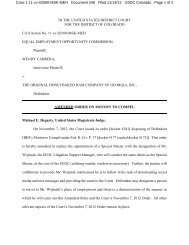Rimkus Consulting Group Inc. v. Cammarata - Ballard Spahr LLP
Rimkus Consulting Group Inc. v. Cammarata - Ballard Spahr LLP
Rimkus Consulting Group Inc. v. Cammarata - Ballard Spahr LLP
Create successful ePaper yourself
Turn your PDF publications into a flip-book with our unique Google optimized e-Paper software.
Case 4:07-cv-00405 Document 450 Filed in TXSD on 02/19/10 Page 69 of 139<br />
3. The Degree of Culpability<br />
Destruction or deletion of information subject to a preservation obligation is not<br />
sufficient for sanctions. Bad faith is required. A severe sanction such as a default judgment<br />
or an adverse inference instruction requires bad faith and prejudice. See Condrey v. SunTrust<br />
Bank of Ga., 431 F.3d 191, 203 (5th Cir. 2005); see also Whitt v. Stephens County, 529 F.3d<br />
278, 284 (5th Cir. 2008) (“[A] jury may draw an adverse inference ‘that party who<br />
intentionally destroys important evidence in bad faith did so because the contents of those<br />
documents were unfavorable to that party.’” (quoting Russell v. Univ. of Tex. of the Permian<br />
Basin, 234 F. App’x 195, 207 (5th Cir.2007) (unpublished))). 33<br />
33<br />
Two cases illustrate the range of culpability. In GE Harris Railway Electronics, L.L.C. v. Westinghouse<br />
Air Brake Co., No. 99-070-GMS, 2004 WL 5702740 (D. Del. Mar. 29, 2004), the court concluded that the<br />
defendant’s employee acted in bad faith by destroying documents that were potentially incriminating, id. at<br />
*4. The plaintiff had sued the defendant and its employee for patent infringement and trade secret<br />
misappropriation. Id. at *1. The parties settled the case and a consent order was entered prohibiting the<br />
employee for three years from involvement in selling any radio-based distributed power product<br />
manufactured by his employer. Id. It was undisputed that the employee was aware of this prohibition. Id.<br />
at *2. During that three-year period, the employee participated in a proposal to sell the product. Id. After<br />
the plaintiff learned about this proposal, it moved for a contempt order. Id. at *1. The parties did not dispute<br />
that the employee deleted computer files related to the proposal when he became aware that the plaintiff<br />
might have concerns. Id. at *2. The court concluded that the employee’s destruction was “clearly motivated<br />
by an intent to eliminate evidence that could potentially incriminate [his employer] in a contempt claim.” Id.<br />
at *4. The court held that dismissal was improper because the prejudice to the innocent party was minimal<br />
but adopted an adverse inference against the spoliating party. Id. at *4–5.<br />
By contrast, in Pandora Jewelry, LLC v. Chamilia, LLC, No. CCB-06-3041, 2008 WL 4533902 (D.<br />
Md. Sept. 30, 2008), there was insufficient evidence that the defendant deliberately deleted emails to find bad<br />
faith. After the plaintiff filed suit, the court granted the defendant’s motion to quash a subpoena for records.<br />
Id. at *1. The defendant then sent a letter to a number of the plaintiff’s customers. Id. The letter purportedly<br />
misrepresented the court’s order granting the defendant’s motion to quash. Id. The defendant also sent this<br />
“letter via email to a number of blind copy recipients.” Id. After the plaintiff filed additional claims, the<br />
defendant contended that it no longer possessed the emails because it “changed its electronic server twice<br />
during the litigation period or due to its email system forcing users to delete or archive emails every ninety<br />
days.” Id. at *2. The court rejected the plaintiff’s motion for sanctions for spoliation. Id. at *6. There was<br />
no evidence, “other than [the defendant’s] failure to retain the emails, that [the defendant] deliberately deleted<br />
or destroyed evidence.” Id. at *9. Although the loss of the emails violated the preservation obligation, this<br />
did not “necessitate a finding of willful or bad faith destruction.” Id. The court held that the defendant was<br />
merely “grossly negligent in its failure to preserve evidence” but declined to impose an adverse inference<br />
instruction or grant summary judgment because the innocent party failed to show that the lost documents were<br />
69



